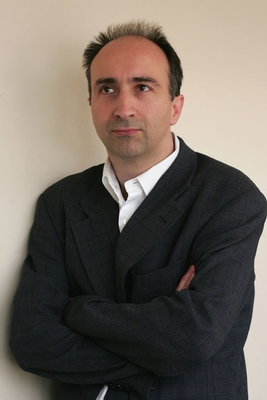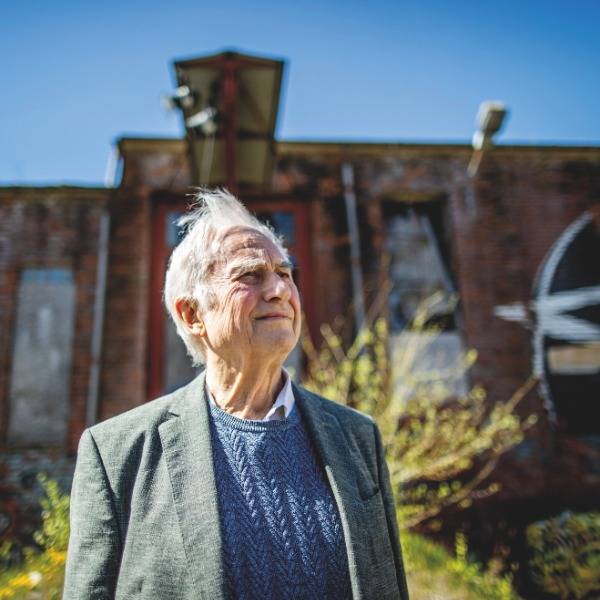
Over the 20-odd years that have passed since making that move, Wood has produced great forests of essays for publications such as the London Review of Books, The New Republic, and The New Yorker; three works of criticism (The Broken Estate; The Irresponsible Self; How Fiction Works); and a novel, The Book Against God. In each of these forms (save, perhaps, that of the novel), he has arguably made a more concerted engagement with the connection between literature and belief than has any living figure, and his criticism radiates a moral seriousness that is fading from our culture like life from a stricken body.
Wood, who now resides in New York (where he is a staff writer for The New Yorker), is in Oxford to deliver this year’s Weidenfeld Lectures at St Anne’s College. The lectures, whose subject is “New Atheism and the modern novel”, will provide the basis of his next book, provisionally entitled In A Fatherless World; and as we meet over pints of Guinness in the back bar of the King’s Arms (“I’ll be the bald git clutching a copy of Beckett,” he warns me in an email), this naturally becomes our opening topic.
Wood’s reservations about New Atheism are apparent from the start: Sam Harris is “all over the place”; for Richard Dawkins to suggest that the history of belief can be attributed to HADD (hyperactive agency detective device) is “just vandalism, and shouldn’t be allowed.” (He is much fonder of Christopher Hitchens, whose literary and historical sensitivity he admires.) What is it about contemporary atheism that makes it a good foil for his discussion of the modern novel? “What I’m talking about with New Atheists is that I agree with their conclusions but dislike the ways they get there. The naughty part of me thrills to the gesture that Dawkins and Harris make when they speak of religious belief as indistinguishable from belief in a vacuum cleaner or a celestial teapot; I like the naughtiness of saying, ‘God can go and fuck off’; but there’s another side of me that thinks it’s probably worth separating out many centuries of quite complex thought – putting aside the fantastically sophisticated and undogmatic forms of Judaism that exist – about the Christian God. The case I make is that New Atheists don’t have a very interesting account of why people believe the things they do. They certainly don’t have much interest in any conception of God that might be beyond language, and they don’t have much interest in a sort of structural contradiction that I’ve always found myself to be involved in, which is the one I write about in The Book Against God, the contradiction being that of holding God close to you while you supposedly don’t believe in Him.”
This contradiction relates to Dostoyevsky’s idea that atheism, by virtue of its being a refusal, remains somehow shackled to belief. Accordingly, professions of unbelief carry with them, as Wood puts it in The Broken Estate, “the duress of a recoil”. “If one doesn’t believe, truly,” he says when I ask him about this in the pub, “then one ought to be able in some way to banish – that’s to say fully expunge from one’s thought and vocabulary – this overbearing notion of God.”
Contradictions of this kind magnetise Wood. He is, in his own phrase, “incurably metaphysical”, and feels that attending to the tensions in atheism can move us closer, humanly and philosophically, to the nature of belief. This is a nature that fiction, with its resistance to conclusion, its addiction to drama, is able to register with unique sensitivity: “I suppose what I like about narrative is that it does offer ways of dramatising these contradictions. Writers can do things that would be anathema to a certain kind of polemical atheist or polemical believer, which is that they can argue against themselves, they can see both sides of the question. So you have the very believing Dostoyevsky mounting a very strongly anti-Christian case in The Brothers Karamazov: Ivan Karamazov makes his complaint against God, and says, ‘I’m going to hand my ticket in because if this is the world that’s been made it’s not a moral order I want to be part of.’ That had a profound effect on me. Dostoyevsky was aware how dangerous it was. He writes to his publisher and says, ‘I don’t want people to get the wrong idea here; I don’t want them to be too affected by the atheism in the book.’ And he actually follows that passage with a 100-page sermon in which he tries to counter that atheist argument, but it didn’t work for me. I only took away the atheistical germ from it.”
What, then, is fiction doing that polemic can’t? “Well, [Herman] Melville, too, was a central figure for me, because I think he really could not find God. But more than that, I think he actually felt that if he found God, He would not be a God he liked. Yet Melville couldn’t quite conceive of letting any of that go, either. And so he just goes back and forth, back and forth. He goes to the Holy Land, and a sort of shudder goes through him and he writes in his diary that this is where the idea of Jehovah was born, this is where this whole awful narrative began, and yet it’s a narrative he can’t escape.”
Yet there is a sense in which Melville’s embracing of indecision functions as a form of refuge. Don’t we have a responsibility to make choices about what we believe? “Of course in any pure sense that’s right. I certainly had a moment like that in my life, and for Dawkins and Co. it’s crucial. Yet we also know that in ordinary life, and again narrative can be a powerful dramatiser of this, many people don’t feel they can choose, or don’t choose. Either they’re not strong enough, or not brave enough, or not intellectually curious enough. But whatever the reasons are, they don’t feel they have much choice in the matter, and they feel that in some way they can’t escape a narrative, that a narrative has chosen them, and the part of me that wants to extend forgiveness to all wants to extend it to believers as well as to unbelievers. Not, obviously, to believers I hate. I grew up in a family with lots of priests and such around. Some were annoying and obnoxious, and some were as liberal as you and me and, in a Rowan Williams kind of way, you could hardly tell that they were believers.”
Wood’s Durham upbringing ripples the surface of much of his criticism, most notably in the autobiographical essay that concludes The Broken Estate; yet it also forms currents in the depths of his novel, The Book Against God. Thomas Bunting, the protagonist of the book, is worried by the possibility that his believing parents will discover his atheism, and I wonder if this is a concern Wood shared as he was growing up. “A little bit. I did have some real quarrels with my parents in my teens and early 20s, and they were pretty strong. But my parents are unlike the parents in The Book Against God, they’re much more evangelical. There’s a lot about evangelicals I don’t like, but one thing I respect is that they take the terms seriously: they take the challenge seriously. So when we had these arguments, they were fierce, because they did feel that my eternal soul was at stake. And they pray for me still. And in the past I would get very worked up, because it mattered to me very much not that I converted them exactly, because I never thought I could do that, but that they could at least credit the rationality and morality of my position.”
Although Wood cannot bring himself to accept the rationality of his parents’ position, he can, in some ways, see the morality of it. The Book Against God, which his parents didn’t read (“my father read about forty pages, but I think he was afraid: I think he thought it would be about him”), offers a sympathetic view of what a pastorally involved Christianity might look like, and Wood recognises a similar beneficence in the practical Christianity of his parents. “They are in their 80s, and their kind of evangelicalism isn’t appealing to me, but when I look at their involvement in their church and their community, it does strike me that they’re not afraid of death; they spend a lot of time at funerals and with sick friends. And if I compare them with my wife’s parents (her father was a lapsed Catholic and her mother doesn’t really have any belief), they spent their declining years palpably terrified of death, unable to deal with that fact, and just avoiding their own decline. So the forgiving side of me sees the ways in which, even though I don’t agree with the premises, a certain kind of religious belief can produce an engaged humanism.”
At this stage James asks me about my own intellectual and religious formation (“there is always a story,” he says). In the course of my (self-consciously brief) reply, I explain that although I have never been a believer, I agree with the character Nicholas in Martin Amis’s novel The Pregnant Widow, who says that, in a way, religion is the most interesting subject there is – but only if you don’t believe in it. James does his naughty-atheist laugh. “I think that’s certainly true. I do feel that. Just from a literary point of view – I don’t mean the boring point that you’re told as soon as you get to university, that religious belief underpins all literature, and you must know all this stuff before you read your Milton, though of course that’s true. But it’s actually religious unbelief that hugely undergirds, I think, the profoundly secular form of the novel. And the believers, the orthodox believers, are far fewer on the ground than the unbelievers. However, the unbelievers are all hugely marked by belief. Not just by what they inherit, but by their own particular struggles.”
Here we arrive at the heart of Wood’s concerns: the novel. While “magic”, this is a form of writing that, unlike religion, is aware of its status as fiction; is aware that it can request belief, but that it must not, cannot, command it. This is one of the qualities that, for Wood, makes the novel “the enemy of superstition, the slayer of religions, the scrutineer of falsity”. Central to this idea, he tells me, is the secularising force, the theological risk, of story: “Imagine yourself in the 19th century in the midst of novels: you are in the midst of lots of stories. There’s a sort of polytheism of stories. And if there are a hundred stories then one story is just one story, and takes its place in that number of stories. That’s deadly to religion, and religion knows it’s deadly, and that’s one of the things I love about the novel.”
“Narrative,” he continues, “is not interested in dogmatically propping up beliefs, or in knocking them down either, but in showing the human inconsistencies of belief. The ways in which people actually do hold beliefs seem to me to have not much to do with actual positions. Their belief, or lack of belief, is sort of intermittent and contradictory, and most people if you asked them would probably say. ‘I don’t really know what I think.’ (Alas, most people don’t really think about it at all, which is another problem.) But in making a case for the novel being a slayer of religion, I think I would give pride of place to the comic. One is really struck by the absence of comedy, not exactly in the Old Testament, because there are a couple of comic moments, for instance it’s suggested that Noah is a bit of a drunk, but certainly in the Gospels. Jesus is not a laugher.”
When we do find comedy in religion, Wood argues in The Irresponsible Self, it is the “comedy of punishment for those who deserve it”. Secular comedy, which “replaces the knowable with the unknowable” and is “the wonderful creation of the late 19th- and early 20th-century novel”, offers “forgiveness for those who don’t”.
For all its bleating about forgiveness, Christianity cannot offer this wonderful humanity, cannot forgive its own creation. “It is sort of chilling. You read Saint Augustine’s Confessions, and see that it’s a great book, in some ways a beautiful book. But when he says that he’s actually distrustful of music, because it detracts from the worship of the Lord, and when he’s arguing about how originally sinful we all are, and offers as an example the baby who has a supposedly egotistical or selfish role when he cries for the mother’s breast – it’s not just that you think that there’s something humanly monstrous about that, but you also think that there’s some sort of arena of the human, that I locate in the novel, which is all forgiving, but which that religious temperament has no connection to at all. People don’t deserve to be judged like that.”

